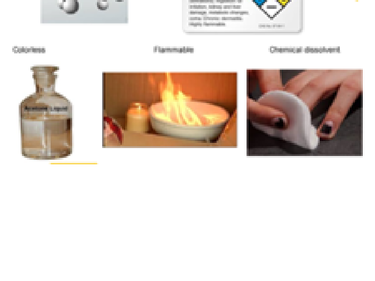
News From the Nest-Spotlight on Learning: Key Chemistry 11 Concepts-- do you know?
Spotlight On Learning
Presented by: Mr. Mario Magon
Subject: Chemistry 11
Driving Question: Optional Inquiry Project - How can students demonstrate a comprehensive understanding of key Chemistry 11 concepts by researching and presenting on a chemical of their choice, while developing their scientific communication skills?
TEACHER DESCRIPTION and / or REFLECTION:
As a BC Chemistry 11 teacher, I designed this course project to offer students an alternative to the traditional final exam. This project serves as a comprehensive assessment of students' understanding across all units covered in the course, while also allowing them to explore a chemical of personal interest.
Project Overview: Students are tasked with creating a presentation about a chemical of their choice, incorporating key concepts from each unit of the Chemistry 11 curriculum. The presentation format (15 slides, 5-minute duration) challenges students to distill complex information into concise, clear explanations. The limitation of ten words per slide and a half-page of notes encourages students to truly understand and internalize the material, as they must present largely from memory and in their own words.
Key Components:
- Introduction to the chosen chemical, its uses, and history
- Application of concepts from all Chemistry 11 units (atomic structure, chemical reactions, stoichiometry, solutions, etc.)
- Practical calculations and problem-solving
- Analysis of the chemical's real-world impacts and effectiveness
- Interview and Authenticity Check: Following the presentation, students undergo an interview where they are asked questions to gauge the authenticity of their work. This component ensures that students have a deep understanding of their chosen topic and can demonstrate their knowledge beyond the prepared presentation.
Reflection: Offering this inquiry project as an alternative to the final exam has proven to be a successful approach. It allows students to engage with the material in a way that best suits their learning styles and strengths. The benefits I've observed include:
- Increased motivation: Students are more enthusiastic about exploring a topic of personal interest.
- Deeper understanding: The project format encourages students to connect different concepts and apply them to a real-world context.
- Development of crucial skills: Students improve their research, synthesis, and presentation skills.
- Personalized learning: The choice between a project and an exam caters to different learning preferences and assessment styles.
- Enhanced engagement: Students show more enthusiasm for the subject when given the opportunity to explore it through a self-chosen lens.
- Comprehensive review: The project naturally leads students to review and integrate knowledge from all course units.
- Authenticity and depth: The interview component ensures that students have truly engaged with the material and can discuss it beyond their prepared presentation.
The one-on-one questioning session after the presentation allows me to assess individual understanding, address any misconceptions, and verify the authenticity of the student's work. This personalized interaction provides valuable insights into each student's grasp of the material and their ability to apply their knowledge in various contexts.
Overall, this project-based assessment approach has contributed significantly to students' academic growth and development in Chemistry. It not only assesses their knowledge but also cultivates important skills such as critical thinking, scientific communication, and independent research – all of which are crucial for their future academic and professional pursuits in the sciences. The addition of the interview component further strengthens the assessment's validity and encourages students to engage more deeply with their chosen topic.